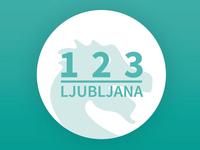1, 2, 3 Ljubljana - a new solution for the promotion of movement and sustainable mobility

We spend more than 9 hours per day sitting and we most often take a car to go shopping or to get to a meeting, instead of walking or taking a bicycle to save fuel, reduce harmful emissions, and get a bit of exercise along the way. The purpose of the new smartphone application ‘1, 2, 3 Ljubljana’ is to promote a healthy lifestyle and help reduce the environmental impact of traffic. It was developed by CVS Mobile, the Research Centre of the Slovenian Academy of Sciences and Arts, and the Faculty of Electrical Engineering at the University of Ljubljana for the project ‘DriveGreen’, which is co-funded by the Slovenian Research Agency. The inaugural public presentation of the application will take place on Friday, 18 March 2016, at 9 a.m. at the Geographical Museum GIAM ZRC SAZU (Gosposka ulica 16, Ljubljana), with cooperation from the City Municipality of Ljubljana.
The application ‘1, 2, 3 Ljubljana’ shows the user how much he or she had walked, cycled, driven a car, or used public transportation in the previous week, month, or year. The application identifies personal achievements solely on the basis of the data it gets from phone sensors, which means that the user does not need a sports bracelet, a smartwatch, or any other device for measuring distance and duration – only a phone.
The application encourages movement and sustainable forms of mobility with different individual and group actions. Individuals can win personal achievement badges, whereas group campaigns have all users in the city work towards a collective reward. Group campaigns are particularly important because they promote cooperation, solidarity, and the understanding that progress involves more than just one person. Every step contributes to an individual’s wellbeing, but also to a cleaner and healthier environment.
Researchers will present the application for the first time ever in this year’s European Green Capital, Ljubljana. In spring and summer, ‘1, 2, 3 Ljubljana’ will be tested with a smaller group of users, and in September 2016, it will become available for free to Android OS smartphone users. It will then be offered to other cities. Its contents and language options will be adjusted to make it possible for users to compare different cities and for cities to compete with each other.
Following a three-month study of movement and sustainable mobility in Ljubljana, a three-month study in Belgrade, and a two-month study in Budapest, research will resume in April 2016 in Newcastle, Great Britain, and will continue in 2017 in Istanbul. “Every city is a tough nut to crack, but its core hides the secret to getting people to change their habits,” explains anthropologist Dr. Dan Podjed, who heads the research and development group of the project ‘DriveGreen’. In Ljubljana, for example, creators of the app will build upon people’s attachment to their local environment and the positive competitiveness between users. The latter can encourage them to make more steps than their ‘neighbor’.
.jpg)
News archive



